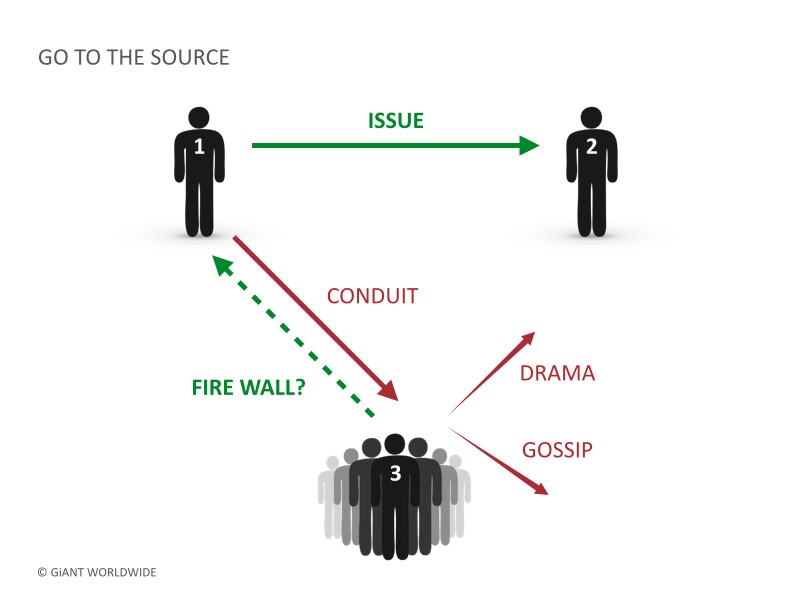This article from GCI-USA Regional Pastor and Equipper writer and feature editor Rick Shallenberger continues our series on Christian leadership.
This is part 5 of a series on Christian leadership. For other articles in the series, click a number: 1, 2, 3, 4, 6, 7, 8.

Many years ago, several people “warned” me about a person I was going to be working with. I was told that this person was really difficult to work with and I’d better go into the relationship prepared for battle. I’m ashamed to say I fell for the talk, and wasn’t at all surprised to find conflict as we started working together.
One day, while praying for this person to be more agreeable and humble, the thought came to me (credit the Holy Spirit): “Do you even know this person? You are basing everything you say and do on what you’ve heard.” Ouch! It was true.
I took the person to lunch and said, “Tell me your story.” By the end of lunch I had a completely different view of them and realized that most who had shared things with me didn’t know this person at all. We ended up having a productive working relationship—once I’d changed.
As leaders, we know how quickly gossip spreads. We can sometimes be surprised at the things we are quoted as having said. We often hear about trials people are going through not from the people themselves, but from others. And we often hear things—about a myriad of topics—and if we aren’t careful, we can jump to conclusions, making decisions based on gossip, rather than on what is true.
Go to the source
Allow me to share a valuable tool produced by GCI-USA’s leadership consultant, GiANT Worldwide. Named “Go to the Source,” it addresses the related topics of gossip, discretion and discipline. I believe that by using this tool we’ll be better leaders—ones who liberate the people they lead.

Go to the Source illustrates what Jesus taught in Matthew 18:15-17. Granted, his instruction addresses offenses that arise from sin, but the principle of going to a sinning brother or sister applies to many things we might hear, and it comes directly against the sin of gossip.
A prime example
In the account of the dividing up of the Promised Land in the book of Joshua, we are told in chapter 22 that Moses assigned to the Reubenites, Gadites, and the half-tribe of Manasseh land located east of the Jordan River. However, before those 2 ½ tribes could settle their territory, Israel needed warriors from all the tribes to clear the land west of the Jordan. After doing so, Joshua gave these 2 ½ tribes permission to return to their land east of the Jordan. Just before crossing over the Jordan River, they built an “imposing altar” on the river’s western bank (Joshua 22:10).

Seeing what these 2 ½ tribes were doing, the other tribes became upset and determined to go to war against their brothers. They sent several chiefs and the high priest to confront this group who (from their perspective) were rebels deserting the faith, starting to follow other gods. These leaders went before the leaders of the Reubenites, Gadites and the half-tribe of Manasseh and accused them:
The whole assembly of the Lord says: “How could you break faith with the God of Israel like this? How could you turn away from the Lord and build yourselves an altar in rebellion against him now?” (Joshua 22:16)
Giving those they accused no opportunity to reply, they continued accusing their brothers of putting all of Israel at risk of the wrath of God for their unfaithfulness.
The situation here is a good illustration of the issues addressed in the Go to the Source tool. Israel had been forbidden to build altars of sacrifice wherever they wanted. There were specific rules to follow. Those who saw the altar, immediately started gossiping among themselves—they got upset, they wanted to go over and destroy their brothers for this rank idolatry! The priests and tribal chiefs served as a conduit for the people’s fear and anger, rather than as a firewall. What they should have done is say, “Let’s go talk to our brothers and see what’s up, rather than prepare for war and storm over with accusations.”
Long story short, the altar was not built for sacrifices—it was built to be a witness, a constant reminder to all that the brothers and sisters on both sides of the Jordan honored and worshipped the same God—the God of Israel. That altar was built to glorify God, not to cause division.
I believe that one of the reasons this story is preserved for us in the Bible is to remind us to always go to the source. As leaders, we need to be a firewall against gossip, and we need to teach others to be firewalls rather than conduits. When we go to the source and encourage others to do so as well, we will have fewer problems with gossip in our congregations.



Please note that comments are moderated. Your comment will not appear until it is reviewed.